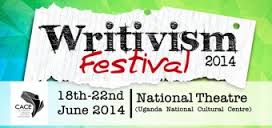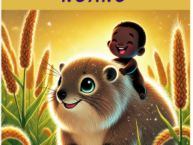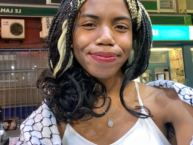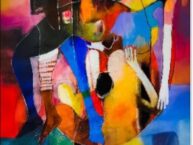 It was always the most complete kind of feeling. Her head underwater, deaf to everything above the surface. Her ears opened to her own heartbeat and the residual of another from years ago, thrumming above the womb she nested in. She sucked water in and out of her mouth. It was her childish triumph, to breathe like this; absorbing oxygen through the mouth-lining, the cells pulsing with osmosis.
It was always the most complete kind of feeling. Her head underwater, deaf to everything above the surface. Her ears opened to her own heartbeat and the residual of another from years ago, thrumming above the womb she nested in. She sucked water in and out of her mouth. It was her childish triumph, to breathe like this; absorbing oxygen through the mouth-lining, the cells pulsing with osmosis.
“You’re not a fish Mariam,” her mother had said. “You need gills to breathe underwater. You don’t have any my girl. Don’t be silly now or else you’ll drown. Lift your head out of the water and breathe, like a normal person.”
“But I’m not like a normal person, Mother,” Mariam wanted to say but soon the water around her would turn to ink, her chest would fill with iron and she had to leave its hold to take the air in human fashion.
Mother was gone some ten years now, but in the water is where Mariam found her again, the rhythm of her cardiac cycle stronger along with the children Mariam lost and never had. Always there, in the depths, they swam on, together.
*
“I just can’t be that transcendent,” Mariam said, looking at her husband and back at the doctor. “I won’t. If they’re not my eggs, they’re not my children. They’ll start with David’s seed and I’ll carry them but all I’ll really be is an incubator. I want my own children. My own.”
Mariam’s words stayed suspended in the consulting room. The doctor looked at the reports before him, shuffling them in exaggeration to slacken the tension between Mariam and David. He said he was sorry but there really wasn’t anything else they could do. The last resort was for her to accept donor eggs. All possibilities had been exhausted.
Mariam wanted to scrunch up the word and aim it at his face. What did he know about exhaustion? He was just one specialist out of the ten they’d seen. It was her insides that had been constantly scraped for cells to be sent off for testing. She was the one who had to swallow and hold down fertility cocktails, never knowing what heinous side-effect would be present in the morning. Examination, re-examination, scan, rescan until all she saw when she looked in the mirror was a woman who carried below her belly, a planet that was incapable of sustaining life.
During the drive home from the doctor’s rooms, Mariam waited for David to say something to her. Instead, he tuned the radio to a talk station where the presenters discussed the best time of year to plant amaryllis.
The anger piled onto her lap like unwieldy boxes, obscuring her vision. She was angry about everything; the incompetent doctors, her dead mother, David and his viable sperm, her own failure to carry a foetus to term, her eggs that had just been found defective, her biological imperative null and void.
David spoke when he pulled the car into their driveway. “I wish you would consider the procedure Mariam. The results are so promising.” David, the pragmatist, always looking out for the best solution.
Mariam turned towards him and punched into his shoulder. “No. No. No. You’re such a bloody man. Don’t you understand? For once, think about how I feel.”
David’s eyes turned to smudged glass.
“That’s all I’ve ever done, Mariam. I’ve tried so hard to be sensitive to what you’re going through. But you just keep pushing me away. I want children Mariam and I want you. I don’t want to have to make a choice.”
The numbness set in just below her ribcage and spiked towards her heart.
“I can’t have this conversation with you right now. I’m going for a swim,” she said.
“That’s your problem, you’d rather jump into the bloody water than have a serious discussion about our future together.” Mariam didn’t hear him, she was already out the door.
*
When Mariam turned 32, her mother called to wish her a happy birthday and to tell Mariam that she had stage four liver cancer. “It’s a waiting game now. I’m not taking the chemotherapy. I really don’t want to prolong the discomfort. Please, don’t make a fuss.” Her mother may as well have been telling her that she’d lost her wallet and had to cancel all her credit cards.
“I did think I’d live to see my grandchildren but things don’t always work out the way we want.”
The family buried her four months later. At the tombstone unveiling, Mariam was the last to leave the graveside. Her eyes locked on to the epitaph ‘Janet Reinhart 1952- 2010 She Loved Her Children’.
Her mother was not affectionate in the conventional sense. There were hugs and kisses on birthdays and when she and her brother brought home gold stars and trophies from school. In the Reinhart house, one was never pulled into a sloppy, squashy embrace without the reaching of a milestone as stimulus.
Mariam only felt close to her mother when they were in the water together. It was Janet who taught her how to swim, how to trust her own body in the water, to respect the depths and quell the treachery of panic by relaxing the muscles and to float off without a fight.
*
The silence in the house stretched thick over weeks and days until David said he was going away. To clear his head and the stuffiness in his heart. He’d be gone for a few days, enough space for them both to untangle their thoughts and for Mariam to decide how she wanted to proceed. She drove him to the airport, feeling nothing but gaps and a canyon caught between their hugging arms. David’s eyelids dammed the water as they kissed and Mariam turned her back to him all the way to an empty house.
In the days after David left, her routine pivoted around her swimming. If it wasn’t for her interior design business and the clients she’d committed to, Mariam would have spent all her time in the water; pruning and ruminating.
It was during her morning swim. She’d just taken one of her human breaths, her head just above the water, the sun slanting off of her shoulder blades, that she saw the boy in the street staring straight at her. The garden service left the gate open, providing an unguarded view into her backyard. She slapped back into the pool and out again. He was still there, watching her swim, transfixed. He had the thrown-together appearance of someone who was used to taking whatever he’d been given.
Mariam rolled in the water, flipped onto her back. She floated for minutes, her mouth the only part of her above water. Another twist and she was back on her belly, her eyes turned towards the street. The child was gone. He was most likely a street urchin, a word her mother would have used. Mariam always liked the term twilight children, as if there was something a little whimsical and romantic about these vagabond spirits, belying the hardships of a day-to-day existence. Mariam’s mood deflated and she emerged heavy from the pool to close the gate. It was getting cold and the water gave her nothing.
It was an uneasy night. Mariam tangled in the bedsheets, caught between too-hot and too-cold. She fell in and out of dreams that made villains of her mother and David. They wanted to strap her down to a bare metal table, spread her legs in the way witches used to be tortured and push pulsing free range chicken eggs up into her uterus. She kicked at them and ran but it was as if her legs had to struggle through set gelatine. Slow-motion horror. She choked awake. A light blinked from the night stand. A voice message from David on her phone. Mariam, this is really hard but I know we can make this work. I’ve been thinking about how you feel and it was insensitive of me to demand you just accept the alternative. I want to have children with you Mariam. I know you’ll be a good mother. But if you can’t go through what the doctor suggested, I respect that. I am willing to sacrifice everything for you. I love you.
Mariam heard David’s voice break open just before he ended the call. A deep emptiness hollowed her. She went to the water.
The pool motor breathed heavy in the dark. Mariam switched on the backyard lights and walked towards the deep end. She preferred diving straight into bodies of water. The shock of the temperature, the rush of blood to the pores, the depth untested; it was how she wanted to live life. Being forewarned is to be disappointed. In this way she never had any expectations, except when it came to children. Who ever thinks they will never have their own children?
Tonight, the blue of the pool disturbed her. It was not complete. It held shadows that were not familiar. A lumpen black floated across. Not the silhouette of the Kreepy Krauly but something with a head and legs.
Mariam dived in. The chill of the water hit her like a wall. For the first time since learning how to swim at her mother’s side, she lost breath and spluttered with frothing panic. She pushed her head back, allowed the water to hold her and sucked in air from just above the water line. Composed and calmer, her body spiralled towards the floating mass. It was a child.
Treading, she cradled the body as she pushed it towards the steps at the shallow end. The water pulled at her with the persistence of oil. Each movement heavier than the next, Mariam struggled against the viscous blue. Release me. Please. The water pulled and snapped back. Mariam tumbled onto the grassy border, still holding on to the child. The light revealed a young boy.
She lay him on his back and pumped his birdlike chest, wincing at the soft snap of rib just under her palm. She looked to the purple of his face and bent to meet it. He was too cold. His lips had swelled into the pout of a napping infant. All the innocence of the world cupped in those buds.
It was then that she noticed the pile of clothes at her side. It was the boy she’d seen in the morning. The twilight child. She remembered the orange t-shirt promoting an electrical supply company. The kind of thing that falls to the back of a cupboard, to be discovered during a spring-clean and discarded. It was the slogan that stuck on her mind; We Will Switch You On. Silly thing for a child to wear unless that’s all he had. The cloth was marked with scorch marks, the hems unravelled. But for muddiness of the lawn, it was clean. There were shoes too, split soles and missing laces.
Mariam picked the boy up. Her arms moulded to his form. She felt no weight, but something warm beneath her sternum. She carried him into the house, a treasure chest from the depths, triumphant.
Fluffy towels would do for swaddling cloths. In the light of her bedroom, she studied him. He was a slender child, straight from shoulder to ankle. Like a line, simply overlooked and easily crossed. His skin bore the purple sheen from the water. His eyelashes still held on to the moisture. She wondered if he had cried when he knew he was drowning.
He must have thought it would be a quick bit of fun. A naughty splash before someone heard him from inside the house. But the blue can be so misleading, especially in the dark, illuminated only by the trickster ghosts of underwater lights. The child must have gone in too far, lost the bottom from under his feet. If only someone had taught him how to float.
She touched his cheek, soft damp chlorinated leather. His face was fine, precise features set in indigo. Her indigo child, given to her by the water.
She fetched supplies from the storeroom. Baby talc and hypo-allergenic perfumes from a hamper David’s company sent just before her first stillbirth. She made holding on to the gift a symbol of her unwavering optimism. But once her reproductive efforts began to falter, she interred it at the very back of the cupboard, under defective kitchen appliances and piles of recycling that never got taken out.
Mariam followed the ritual she’d witnessed when her mother used to bathe her baby brother. Gently press the warm towels to the skin to absorb the moisture. Anoint with lavender-scented oil in sweeping touches of maternal love. Dust with talc to finish like icing sugar on cake. She raised the child’s arms and slipped on one of David’s t-shirts; a voluminous cerement draped across the child’s thighs and skimming the tops of his knees.
She stretched out in a space next to the boy and spooned against him. She laid her hand on his chest to seek out a telling beat but it was as if she pressed over hollowed wood. She held her ear to his mouth and heard only the void of a silent sea.
It occurred to her that sleeping beside a child that had just drowned in her swimming pool was rather macabre. But there was nothing ghoulish about the gift laid out next to her. Had he not been delivered unto her? Did she not bear him out of the depths? Was it not a labour that brought him out into the air?
She remembered the first baby she’d lost. She was too far gone in her pregnancy and had to push him out into a world he was already dead to. She remembered his pinched face and choked colouring. He didn’t look like her or David, but something that had to have belonged to someone else, a cuckoo bird planted in her uterus while she slept. And after that, two more miscarriages. More imposters. Changelings to bury and mourn. She did not want another alien put inside her. But this child, he was hers. They’d been held by the same pulsing amniotic fluid, emerged from one womb, her brother-child. Not even a part of David, just hers and the deep.
She wondered about him before he came to her. The other life before this rebirth in her backyard. She imagined a long-suffering, hard-scrounging, desperate yearning for a home. He’d seen her in the pool and wanted to know his mother and now he was here and she would give him everything. She looked at his face again. The lips had parted further, revealing the gaps between his teeth in the kind of revealing perfection captured by a spontaneous photograph.
How long before her room would fill with the sweet decay of flowers. How long before she’d have to give him up? No, not just yet. She switched off the bedroom light and slept through the night.
The morning came upon her in a single act. She woke to startling brightness, her arm still across the dead child in her bed. A greyness had sunk into his pores. His face slacked. His skin had lost its yield. Mariam passed her hand over his forehead and tasted the hot salt from her eyes slide into her mouth. The phone on the bedside table beeped. A message from David. My Darling. I’m coming home today. I’ve had enough time to think. We’ll talk soon. Properly. I promise. I love you.
The thought of David coming home filled her with a strange alchemy of hope and unsteadiness. In the last few days it was as if he was always just on the periphery of her experiences. A bystander, a sperm donor, a holder of her hand, a shoulder she crushed into during the hush of a velvet night. And now her wretchedness rose up in her throat. David deserved so much more, and she would be the one to give it to him.
She had to return her child to the water. Not to hide her strange night from David but to set her world right. This child of her heart, this child without a name, he was not really hers to keep.
The backyard was guiltless. The sun brushed silver against the pool’s blue. The lawn looked lush; a paradise for ants. The garden service would be in the next day to trim the tips of the grass. They always took off a little too much. She liked it better when it was a bit overgrown. The pile high and tender, hiding her bare feet as she absorbed the cool green through her soles.
Today the child was heavier in her arms, his stiff limbs awkwardly angled. It was time.
She placed him on the grass closest to the edge of the pool. She dipped her hand into the water and drew a star on both his cheeks. They couldn’t be gold ones but he would still leave being celebrated in some small way. Perhaps his real mother mourned him somewhere else, but here in Mariam’s arms he was lucky to know of another love.
Her tears splashed across his receding lips and she leaned in to kiss him. Despite the rigidity of the boy’s arms, she was able to pull off David’s t-shirt with the grace of a magician. He was ready to be returned. And she slipped him back into the water.
She wanted to follow him. Listen again for the heartbeat, float on her belly like a pond lily, look for the face of her child. The pool was as receptive as ever but she pulled back.
There would be other children for her, ones who didn’t need the water.
Mariam turned her face upward towards the sky; a warm blue expanse, depth-less and waiting.
About the Author
Saaleha Idrees Bamjee is a freelance writer, photographer and incidental designer who lives and works in Johannesburg, South Africa. She has an MA in Creative Writing from Rhodes University, Grahamstown. Her poetry has appeared in South African literary journals and can also be read online at www.saaleha.com. She is one of the 2014 Writivism workshop participants in Cape Town, and was also a mentee under the Writivism mentoring program. Her shortlisted story is titled ‘Out of the Blue’.


